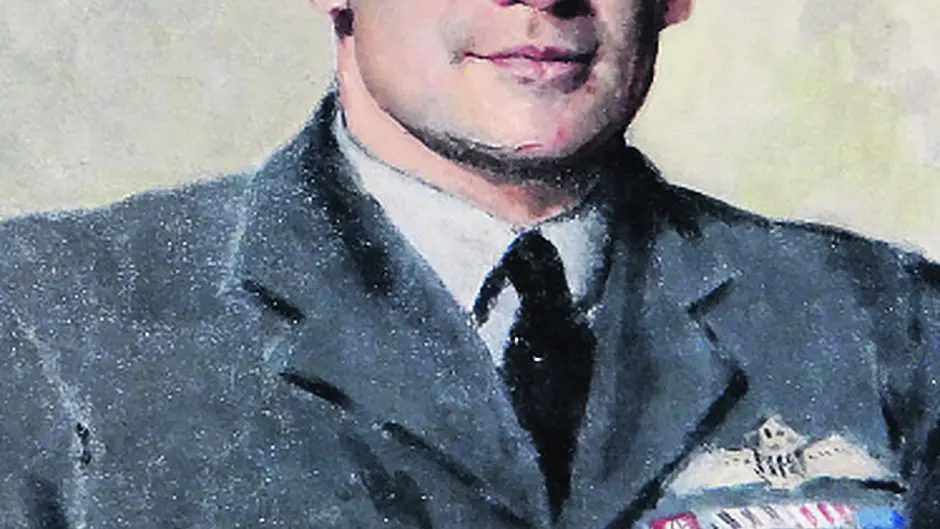WWII pilot should also be acknowledged in his native Dunmanway, says local councillor
DUNMANWAY native RAF group captain Francis Victor Beamish was commemorated last weekend in Co Kerry as part of the Listowel Military Tattoo.
This year the organisers sought to commemorate the RAF hero who was born in Acres outside Dunmanway because of his World War II flying achievements, and his contribution to Irish rugby.
The committee at Listowel also noted the similarity and resemblance of the square in Listowel to that of St Mere Eglise in Normandy, France, and as such the square in Listowel became the venue for the unveiling of the centrepiece of the weekend’s events – a full-scale Spitfire.
The impressive model Spitfire, measuring 30ft long, with a 36ft wingspan, was certainly the star of the show. Based on the plans and drawings of Captain Beamish’s spitfire from the RAF, it was painted in wartime camouflage colours, together with the initials FVB.
An ambitious twelve-month project, the plane was built voluntarily by enthusiasts from original Spitfire drawings and manufacturers’ blueprints. It was constructed by the combined Men’s Shed Group of Ballyduff and Listowel who worked tirelessly and unselfishly giving all their spare time to the project.
In attendance for the unveiling were immediate family members of the late Francis Victor Beamish. MC for the event were Damien Stack and Padraig Nolan of the Listowel Military Tattoo committee, while Victor Beamish (son of Charles Beamish and nephew of Captain Francis) gave a poignant address on his family’s incredible sporting achievements and RAF service.
Mrs Josephine Beamish, wife of the late Charles (and sister-in-law to Captain Beamish), who personally remembered him, cut the ribbon which was attached to the propeller.
Representing Dunmanway, Cllr Declan Hurley extended cordial greetings to the Beamish family and the crowds gathered in Listowel Square. He acknowledged the contributions of Captain Beamish and those of his other brothers to the war effort, and extended an invitation to the family to visit Dunmanway.
Cllr Hurley also acknowledged Capt Beamish deservedly warrants commemoration in the town of his birth for his heroic contribution and his sporting prowess.
The Listowel Military Tattoo, first held in 2012, is a unique community supported event which has grown year-on-year. A weekend of exhibitions, concerts, talks, ceremonies and re-enactments dedicated to fallen heroes and lives lost in various worldwide conflicts, it also emphasises Irish heroes.
It is a weekend-long festival with diverse events and displays by the Irish Army, Irish Navy, and Coastguard, and historical re-enactments of the Romans, Vikings and World War II.
Pete McWilliams, chairman of RAFA Republic of Ireland branch, made a presentation to the Beamish family, and the family kindly put on display various photographs and irreplaceable artefacts obtained during extraordinary times depicting the distinguished RAF and sporting narrative of the four brothers (Francis Victor, George, Charles and Cecil) and their two sisters Eileen and Kathleen.
The exhibition included unique items such as citations from US presidents (Truman and Eisenhower), medals, trophies, RAF Battle and ceremonial dress tunics, Irish and British Lions rugby jerseys and caps, many of them never before displayed.
The crowd heard how the contribution of the Beamish family (collectively and individually) is immeasurable – from sporting achievements in rugby, golf, squash, boxing and hockey to work with the renowned pioneering plastic surgeon Sir Archibald McIndoe, and involvement in most major WWII conflicts.
The contributions made by the Dunmanway Flying Aces assisted the RAF victory in the summer of 1940, which may have helped to safeguard neutral Ireland as well as Britain from Hitler’s invasion plans.
It was noted that invasion would have profoundly altered the course of Irish history, so we should never forget the crucial role played by people such as Francis Victor Beamish, his brothers and many other Irish colleagues.








